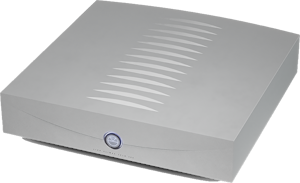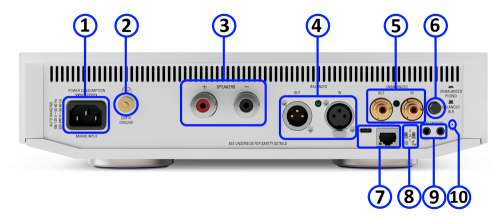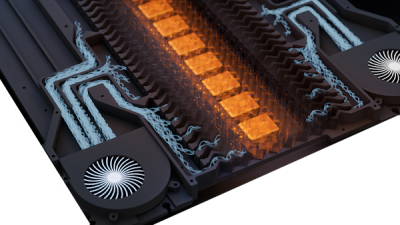Difference between revisions of "Power Amplifier/Klimax Solo 500"
m (→Connections & Operation) |
m (→Back panel) |
||
| Line 159: | Line 159: | ||
# '''INPUT SELECT''' - To connect XLR or RCA inputs.<br> | # '''INPUT SELECT''' - To connect XLR or RCA inputs.<br> | ||
# <b>SERVICE PORTS</b> <sup>'''2'''</sup> - Covering Exakt & USB sockets (These are <b><u>ONLY</u></b> used for <u>Service</u> options.) | # <b>SERVICE PORTS</b> <sup>'''2'''</sup> - Covering Exakt & USB sockets (These are <b><u>ONLY</u></b> used for <u>Service</u> options.) | ||
| − | # <b>Brightness & Auto-Standby<sup> | + | # <b>Brightness<sup>3</sup> & Auto-Standby<sup>4</sup></b>, - Switched brightness levels for the front panel status roundel and auto-Standby options |
| − | # # <b>12V trigger<sup> | + | # # <b>12V trigger<sup>5</sup></b>,- To remotely bring the amplifier in/out of lower power state using a 12V control signal. |
# <b>FALLBACK</b> - T0 force the Solo 500 in to software fallback mode for programming. | # <b>FALLBACK</b> - T0 force the Solo 500 in to software fallback mode for programming. | ||
Notes: | Notes: | ||
| − | :<sup>'''1'''</sup> The IN/OUT sockets are hard wired together to allow amplifier daisy-chaining. | + | :<sup>'''1'''</sup> The IN/OUT sockets are hard-wired together to allow amplifier daisy-chaining. |
:<sup>'''2'''</sup> Exakt sockets & USB-C sockets ONLY for Software update, configuration setup. | :<sup>'''2'''</sup> Exakt sockets & USB-C sockets ONLY for Software update, configuration setup. | ||
| − | :<sup>'''3'''</sup> Check [[# | + | :<sup>'''3'''</sup> Check [[ #LED brightness control| <b>LED brightness control</b>]] section below |
| − | :<sup>''' | + | :<sup>'''4'''</sup> Check [[#Auto-Standby settings| <b>Auto-Standby settings</b>]] section below |
| + | :<sup>'''5'''</sup> Check [[#12V Trigger|<b>12V trigger</b>]] section below | ||
<br><br> | <br><br> | ||
Revision as of 14:43, 22 May 2025
Webpage under construction
The information on this page may be incorrect and will be updated before release.
|
Linn Klimax Solo 500 Mono power amplifier 
|
| ||||||||||||
Product information
| • Product Name: |
KLIMAX SOLO 500
|
| • Date of Introduction: | May 2025
|
|
| |
| • Type: | Mono Power Amplifier Class A/B
|
Description
- With Klimax Solo 500, our latest top-tier innovations powerfully coalesce into the best compact monoblock amplifier we have ever made.
- Klimax Solo 500 features novel and original Linn technologies which combine to produce staggeringly low distortion measurements, with superb signal-to-noise ratio and incredible efficiency (voltage rail control).
- In a normal setup, one hears the accumulation of interactions between speaker and amp – a combination of non-ideal characteristics which result in artefacts heard in the music. Linn’s focus on relentless minimisation of distortion within the amp, and unilaterally consistent output, means that Klimax Solo 500 introduces negligible harmonics or background noise to the music signal.
- Linn’s unique combination of digital and analogue expertise has allowed them to optimise and linearise every internal stage of the amplifier to consistently produce exceedingly high performance.
Manuals
Installation
We recommend that your Klimax Solo 500 power amplifiers are unpacked, installed and adjusted by an authorised Linn retailer.
To get the best from your Solo 500 Amplifiers, it is important that they be positioned and wired correctly.
Unpacking
- We recommend that you retain the packaging in case you need to transport your power amplifiers at a later date.
- Take care when unpacking to avoid damage to the case.
Connections & Operation
Low power state
- In normal operation, not using the 12V trigger, the power amplifier will go into low-power-state after 20 minutes of no audio. Any signal on the XLR or RCA will quickly bring the power amplifier out of low-power-state and start playing.
Front panel
|
|
|
Linn Roundel

|

|

|

|

|

|

|

Back panel
- MAINS INPUT - To connect to the mains electricity supply.
- EARTH TERMINAL -for use in countries without mains earth in power cable.
- POWER OUTPUT - 4 mm terminals for connecting to the loudspeaker.
- BALANCED INPUT/OUTPUT 1'(XLR-Line level)
- RCA INPUT/OUTPUT 1 RCA-Line level
- INPUT SELECT - To connect XLR or RCA inputs.
- SERVICE PORTS 2 - Covering Exakt & USB sockets (These are ONLY used for Service options.)
- Brightness3 & Auto-Standby4, - Switched brightness levels for the front panel status roundel and auto-Standby options
- # 12V trigger5,- To remotely bring the amplifier in/out of lower power state using a 12V control signal.
- FALLBACK - T0 force the Solo 500 in to software fallback mode for programming.
Notes:
- 1 The IN/OUT sockets are hard-wired together to allow amplifier daisy-chaining.
- 2 Exakt sockets & USB-C sockets ONLY for Software update, configuration setup.
- 3 Check LED brightness control section below
- 4 Check Auto-Standby settings section below
- 5 Check 12V trigger section below
12V Trigger
- The 12V Trigger input trigger interface, which can be linked with other devices to switch into / out of a low power state.
- When low, the power amplifier goes into a low-power-state.
- When 12V is applied to this input, this brings the power amplifier out of low-power-state and ready to play within 1second.
- However, if 12V has been applied, but there has not been an audio signal for an extended period of time, this will put the power amplifier into low-power-state.
- The 12V Trigger input trigger interface, which can be linked with other devices to switch into / out of a low power state.
Auto-Standby settings
- This allows more settings in the Auto-Standby function and overall power used.

- 3: No auto-standby. (Never enters Low-Power mode)
- 2: "Shallow" auto-standby after 20 minutes without a signal. Almost immediate audio upon waking up.
- 1: "Deep" auto-standby after 20 minutes without a signal. Audio will take a few seconds before waking up.
LED brightness control
- Control for front panel roundel brightness

- 3: Maximum brightness.
- 2: Mid-level brightness.
- 1: Minimum brightness.
FAQ
What is Adaptive Bias Control
- Adaptive Bias Control technology is the control of the ideal bias current for all the amplifier output transistors. This is established dynamically and in real-time by measuring, sampling and digitising the current measurement, then using a closed loop to set the output bias voltage through a DAC and novel analogue floating bias circuit.
- A digital control loop then implements and persistently adjusts this optimum bias current for the transistors; negating crossover distortion at any temperature – regardless of volume or demanding dynamic changes in music – for the entirety of the amp’s life.
Utopik for Klimax Solo 500
- Linn’s all-new, Utopik switch-mode power supply topology for Klimax Solo boasts precision-regulated power rails. It provides the best of both worlds, generating 2kW maximum power output whilst retaining speed, responsiveness and consummate efficiency. It maintains extremely steady output voltage; the rails perform consistently in the face of dramatic loading changes. What’s more, if the mains input varies, the output won’t – remaining stable and ultrapure at all times.
- With Utopik, Linn minimise switching noise and improve efficiency by utilising a technique called ‘soft-switching’; a resonant tank circuit ensures that voltage across the switch falls to zero before the switch is thrown. Thanks to soft-switching, Utopik is cleaner, more efficient, and remains whisper-quiet over the full range of operating conditions.
Cool running

- Klimax Solo 500 features a brand-new thermal management system—a hybrid cooling matrix—which ensures that the amplifier can adapt in response to the demands placed upon it, remaining cool and whisper-quiet at all times.
- Designed and optimised using sophisticated simulation software, machined internal fins form a labyrinthine network of precisely measured channels. These fins naturally radiate heat upwards and out through precision-cut gills in the amplifier’s upper casework. This natural convection and radiation system is ideal for keeping Solo 500 cool during everyday listening sessions.
- When the amp is pushed very hard, however, this is where Solo 500’s hybrid cooling matrix gets really clever… The amp switches to active cooling by way of two internal fans positioned deep within the product.
- Linn has designed an intelligent fan management system for Solo 500. Monitored and controlled by an FPGA processor in real-time, the required fan speed is determined by a combination of both the measured internal temperature of the amplifier and the input audio signal. This ensures that the fans run inaudibly at the lowest speed possible at any given time, whilst providing ample cooling to avoid overheating and thereby maintain ideal performance, listener experience, and efficiency.
Class-V control
- Class-V control is variable voltage rail control. The advantage of using 'Class-V' control is purely related to the thermal performance/efficiency of the amplifier, not the audio performance. Specifically, it allows the amplifier to dissipate less power and therefore run cooler at low and moderate listening levels without any degrade in audio performance.
- This is actioned with the Utopik power supply, this allows us to change the output voltage. This allows the Klimax Solo to have the Class-V control. This allows Linn to produce a high-power amplifier in a small package.
Is the Solo 500 Suitable for Any Speakers?
- The Klimax Solo 500, like the Solo 800 is capable of delivering a lot of power on demand. The Solo 500 will deliver up to 500W into a 4 Ohm load. Like any standalone mono-block power amplifier, it can only protect itself from overload. It has no knowledge of the speaker load connected to it, so it is not able to protect the speaker from currents that may damage it.
- To prevent damage to the speaker, the volume should be suitably limited unless the loudspeaker itself includes suitable protection circuitry. If there is any doubt then seek advice from the speaker manufacturer.
Technical Specifications
| Overview |
| ||||||||
| Dimensions |
(H) 88.5 mm x (W) 350 mm x (D) 364 mm | ||||||||
| Weight | 10.6 kg / 23.4 lb | ||||||||
| Mains supply voltage | (auto-ranging)
| ||||||||
| Power Supply | 2kW Utopik | ||||||||
| Power consumption |
| ||||||||
| Power Control protocol |
and/or
| ||||||||
| Amplier Class | Transistor power amplifier using Class A/B with voltage rail control (Class-V) | ||||||||
| EXAKT | For Service communication. ONLY | ||||||||
| inputs | 1off RCA socket (Gain 28.6dB) | ||||||||
| 1off Balanced XLR (Gain 22.6dB) | |||||||||
| Passthrough (Daisy-chaining) |
1off RCA socket, | ||||||||
| 1off Balanced XLR | |||||||||
| Speaker Outputs |
1Pr Banana/Binding posts | ||||||||
| Output Impedance | 0.01Ω at 1kHz | ||||||||
| Output power |
250W into 8Ω | ||||||||
| THD+N |
8 Ω - 0.0004% | 1kHz | 250 W |

